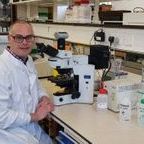Speakers

Alexandra Yates

David Gaze

Supriya Joshi

Dominic Harrington

Emma Stevenson

4.15pm – 5.30pm BST, 11 June 2024 ‐ 1 hour 15 mins
Parallel session
Chairs: Alexandra Yates and David Gaze
In August this year LabMed asked members for input into the consultation request on the NICE guidance on Vitamin B12 deficiency in over 16s: diagnosis and management.
The membership responded in unprecedented numbers, expressing both support for these guidance but also some concerns. In this session we will review the NICE guidance (published March 2024) and its impact on laboratory medicine, with views from those involved in the production of the guidance, GIRFT and LabMed membership. This debate session will provide an lively interactive and interesting overview of the laboratory medicine aspect of the NICE guidance on Vitamin B12.







Alexandra, is a Consultant Clinical scientist in the Clinical biochemistry department at the Countess of Chester hospital, GB, where her interest include analytical interferences, renal medicine, and quality improvement. Other wider interest include equality and diversity within healthcare organizations, Alexandra is passionate in enacting meaningful change leading to equity for all and recognizing the benefits this bring to the healthcare and wider community.
Alexandra was appointed as Director of Scientific affairs for the Association for Laboratory medicine in May 2019 after 5 years on the scientific committee, and a previous role as a national member on the LabMed council.
As chair of the Scientific and clinical practice committee, she leads the committee in the vision that; the scientific committee and clinical practice committee should serve all LabMed members across pan-pathology disciplines, enabling and promote translation research and innovation, and providing scientific and clinical expertise to our strategic partners, benefiting the wider health care community.
Pronouns: She/her

Dr David Gaze is a Senior Lecturer in Chemical Pathology, Course Lead for the MSc Biomedical Science degree and School Director of Employability at the University of Westminster, London. with research interests in cardiovascular biomarkers, cardiac pathology and the cardio-renal syndrome.
Dr Gaze has authored and co-authored in excess of 150 peer reviewed papers and 200 abstracts, as well as presented at over 50 internationally invited conferences. He has contributed five book chapters to cardiovascular related textbooks as well as writing a textbook on cardiac troponin. He is a peer reviewer for 25 medical journals. He is the commissioning editor for review articles for the Annals of Clinical Biochemistry & Laboratory Medicine.
He is a member of the Royal Society of Medicine of London; The Association for Laboratory Medicine, of which he is Deputy director of the SACP committee. He chairs the Clinical Sciences Review Committee (CSRC) for the Annals of Clinical Biochemistry. He is also a member of the American Association of Clinical Chemistry; Institute of Biomedical Sciences; Institute of Biology; European Society of Pathology; The Pathological Society of Great Britain and Ireland and associate member of the Royal Institution of London.
Gaze and colleagues have won a number of awards including two distinguished Abstract awards from the National Academy of Clinical Biochemistry as well as Diploma for Oral Presentation regarding D-dimer, natriuretic peptide and cardiac troponin in dialysis patients presented at the 17th IFCC-FESCC European Congress of Clinical Chemistry and Laboratory Medicine and the 60th National congress of the Netherlands Society of Clinical Chemistry and Laboratory Medicine in Amsterdam in 2007.

Appointed as a Consultant Chemical Pathologist at Maidstone and Tunbridge Wells NHS Trust in June 2015. I am interested in clinical effectiveness in pathology, pursuing conversations around improvements in patient outcomes to fund pathology testing and raising awareness of pathology as a clinical service rather than a ‘factory’.

Dominic is a Consultant Clinical Scientist with a primary interest in the development and application of biomarkers for the assessment of vitamin status. To support this, he coined the word ‘Nutristasis’ and established the ‘Human Nutristasis Unit’ at St. Thomas’ Hospital more than 25 years ago. The Unit now has a dedicated team of 14 scientists. Dominic also established the international external quality assurance scheme for vitamin K (KEQAS) in 1996. His PhD was on the ‘Development of Chromatographic Methods for the Measurement of the Urinary Metabolites of Vitamin K and Their Utility for Vitamin K Status Assessment’. Dominic has published more than 80 scientific papers and books. He has an honorary academic position at King’s College London and is a visiting professor at the School of Biosciences and Medicine, University of Surrey.
In addition, Dominic has been Head of Service for Laboratory Haemostasis & Thrombosis at Guy’s and St. Thomas’ (since 2009); Scientific Director for laboratory services across Guy’s and St. Thomas’ (2012-17); Chief Scientific Officer for pathology services across south east London (Synnovis) (2017-). He also provides scientific leadership for SYNLAB UK and Ireland (2023-). He established the Innovation Academy in 2013 and hosts an annual Innovation Academy symposium. In 2013 he established the Future Leaders in Innovation group to provide opportunities for our leaders of the future.

Emma is a principal clinical scientist based in the clinical biochemistry laboratories at Gloucestershire Hospitals NHS Foundation Trust. She is Chair of the LabMed Education Group and Deputy Director of Education, Training and Workforce. Outside of education and training, Emma’s main interest in the laboratory is quality, including EQA, IQC and measurement uncertainty. Emma is a member of the RCPath’s Chemical Pathology National Quality Assurance Panel, which oversees the running of EQA schemes in biochemistry.
Pronouns: She/her

I was a Consultant clinical and laboratory Haematologist in Colchester for 25 years . Alongside clinical work, I undertook several leadership and management roles, at both local and regional level. These included training and educational responsibilities for junior medical and laboratory staff, Clinical Lead for Organ Donation, Deputy Medical Director and subsequently Medical Director for the Trust.
I was also actively involved in the Association of Clinical Pathologists for many years, including secretary to the Association (2011 – 13) and Honorary Chair (2013 – 18).
Since 2018 I have been a Co-Lead for Pathology “Getting it Right First Time” (GIRFT). GIRFT identifies and highlights variation in practice, as a way to learn and improve our care for patients. Following publication of our National Report in 2021, we have focussed on areas of significant variability, including performance of B12 assays. An audit of laboratory practice in 2023 highlighted significant areas of concern and was used to respond to the NICE consultation about their latest guidelines.